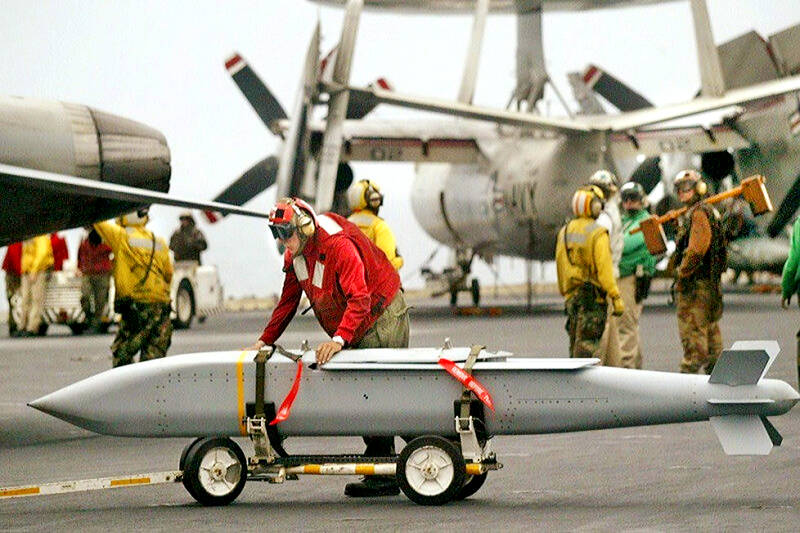The US Department of Defense is to partner with RTX Corp, formerly Raytheon Technologies Corp, to deliver 50 AGM-154 Joint Standoff Weapons (JSOW), or glide bombs, to Taiwan over the next four years, a report published on Friday showed.
The report, published on the department’s Web site on Friday, said that 50 AGM-154 Block III C JSOWs would be delivered to Taiwan under a fixed-price contract worth US$68.4 million.
Most of the production of the weapons would be done in Tucson, Arizona, and would be completed by March 2028, the report said.

Photo: AFP
The report comes after Reuters on Thursday quoted US officials as saying that the US military had left equipment in Australia following last year’s Talisman Sabre 23 joint exercise, with the intention that it could be used by US forces in the event of a conflict with China over Taiwan.
The glide bombs are part of a larger arms package of seven items initially announced by the US in June 2017. It also included the AGM-88 HARM (High-speed Anti-radiation Missile) and other weapons that could be used with Taiwan’s F-16 jets. The weapons were intended to complement other upgrades to Taiwan’s F-16 fleet, which also included radar and communications system upgrades.
The AGM-154 is a JSOW that emerged through the US Navy’s Advanced Interdiction Weapon System program launched in 1987, which sought to develop weapons that are usable day or night, and in any weather conditions.
The JSOWs designed for the program are “fire and forget” weapons, meaning they do not require external guidance after launch. Instead, they navigate to their targets via a GPS/inertial navigation system. JSOW weapons have been replacing conventional laser-guided bombs, and the newest JSOW weapons also incorporate infrared guidance systems.
JSOW weapons dropped at high altitude can reach targets as far as 110km away, and those launched at low altitude can strike up to 22km away, which would enhance the F-16 jet’s land attack capabilities.
Countries other than the US that are purchasing AGM-154 glide bombs include Taiwan, Australia, Finland, Greece, Poland, Singapore and Turkey.
Taiwan has facilitated the incorporation of the weapons into its fleet by upgrading its older F-16A/B fighter jets to the F-16V variant through the Phoenix Rising Project and through the purchase of newer Block 70 fighters.
The upgraded jets as well as the Block 70 fighters can carry AGM-154C glide bombs, which could help diversify the Taiwanese air force’s air-to-ground combat capabilities.

PREPAREDNESS: Given the difficulty of importing ammunition during wartime, the Ministry of National Defense said it would prioritize ‘coproduction’ partnerships A newly formed unit of the Marine Corps tasked with land-based security operations has recently replaced its aging, domestically produced rifles with more advanced, US-made M4A1 rifles, a source said yesterday. The unnamed source familiar with the matter said the First Security Battalion of the Marine Corps’ Air Defense and Base Guard Group has replaced its older T65K2 rifles, which have been in service since the late 1980s, with the newly received M4A1s. The source did not say exactly when the upgrade took place or how many M4A1s were issued to the battalion. The confirmation came after Chinese-language media reported

A Ministry of Foreign Affairs official yesterday said that a delegation that visited China for an APEC meeting did not receive any kind of treatment that downgraded Taiwan’s sovereignty. Department of International Organizations Director-General Jonathan Sun (孫儉元) said that he and a group of ministry officials visited Shenzhen, China, to attend the APEC Informal Senior Officials’ Meeting last month. The trip went “smoothly and safely” for all Taiwanese delegates, as the Chinese side arranged the trip in accordance with long-standing practices, Sun said at the ministry’s weekly briefing. The Taiwanese group did not encounter any political suppression, he said. Sun made the remarks when

The Taiwanese passport ranked 33rd in a global listing of passports by convenience this month, rising three places from last month’s ranking, but matching its position in January last year. The Henley Passport Index, an international ranking of passports by the number of designations its holder can travel to without a visa, showed that the Taiwan passport enables holders to travel to 139 countries and territories without a visa. Singapore’s passport was ranked the most powerful with visa-free access to 192 destinations out of 227, according to the index published on Tuesday by UK-based migration investment consultancy firm Henley and Partners. Japan’s and

BROAD AGREEMENT: The two are nearing a trade deal to reduce Taiwan’s tariff to 15% and a commitment for TSMC to build five more fabs, a ‘New York Times’ report said Taiwan and the US have reached a broad consensus on a trade deal, the Executive Yuan’s Office of Trade Negotiations said yesterday, after a report said that Washington is set to reduce Taiwan’s tariff rate to 15 percent. The New York Times on Monday reported that the two nations are nearing a trade deal to reduce Taiwan’s tariff rate to 15 percent and commit Taiwan Semiconductor Manufacturing Co (TSMC, 台積電) to building at least five more facilities in the US. “The agreement, which has been under negotiation for months, is being legally scrubbed and could be announced this month,” the paper said,